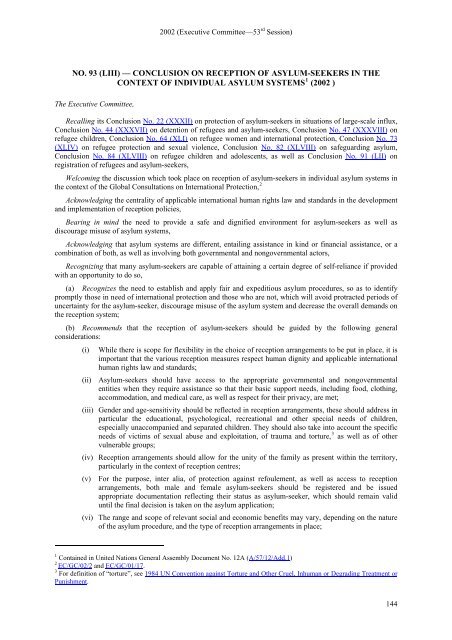CONCLUSIONS ADOPTED BY THE EXECUTIVE ... - UNHCR
CONCLUSIONS ADOPTED BY THE EXECUTIVE ... - UNHCR
CONCLUSIONS ADOPTED BY THE EXECUTIVE ... - UNHCR
Create successful ePaper yourself
Turn your PDF publications into a flip-book with our unique Google optimized e-Paper software.
2002 (Executive Committee—53 rd Session)<br />
NO. 93 (LIII) — CONCLUSION ON RECEPTION OF ASYLUM-SEEKERS IN <strong>THE</strong><br />
CONTEXT OF INDIVIDUAL ASYLUM SYSTEMS 1 (2002 )<br />
The Executive Committee,<br />
Recalling its Conclusion No. 22 (XXXII) on protection of asylum-seekers in situations of large-scale influx,<br />
Conclusion No. 44 (XXXVII) on detention of refugees and asylum-seekers, Conclusion No. 47 (XXXVIII) on<br />
refugee children, Conclusion No. 64 (XLI) on refugee women and international protection, Conclusion No. 73<br />
(XLIV) on refugee protection and sexual violence, Conclusion No. 82 (XLVIII) on safeguarding asylum,<br />
Conclusion No. 84 (XLVIII) on refugee children and adolescents, as well as Conclusion No. 91 (LII) on<br />
registration of refugees and asylum-seekers,<br />
Welcoming the discussion which took place on reception of asylum-seekers in individual asylum systems in<br />
the context of the Global Consultations on International Protection, 2<br />
Acknowledging the centrality of applicable international human rights law and standards in the development<br />
and implementation of reception policies,<br />
Bearing in mind the need to provide a safe and dignified environment for asylum-seekers as well as<br />
discourage misuse of asylum systems,<br />
Acknowledging that asylum systems are different, entailing assistance in kind or financial assistance, or a<br />
combination of both, as well as involving both governmental and nongovernmental actors,<br />
Recognizing that many asylum-seekers are capable of attaining a certain degree of self-reliance if provided<br />
with an opportunity to do so,<br />
(a) Recognizes the need to establish and apply fair and expeditious asylum procedures, so as to identify<br />
promptly those in need of international protection and those who are not, which will avoid protracted periods of<br />
uncertainty for the asylum-seeker, discourage misuse of the asylum system and decrease the overall demands on<br />
the reception system;<br />
(b) Recommends that the reception of asylum-seekers should be guided by the following general<br />
considerations:<br />
(i) While there is scope for flexibility in the choice of reception arrangements to be put in place, it is<br />
important that the various reception measures respect human dignity and applicable international<br />
human rights law and standards;<br />
(ii) Asylum-seekers should have access to the appropriate governmental and nongovernmental<br />
entities when they require assistance so that their basic support needs, including food, clothing,<br />
accommodation, and medical care, as well as respect for their privacy, are met;<br />
(iii) Gender and age-sensitivity should be reflected in reception arrangements, these should address in<br />
particular the educational, psychological, recreational and other special needs of children,<br />
especially unaccompanied and separated children. They should also take into account the specific<br />
needs of victims of sexual abuse and exploitation, of trauma and torture, 3 as well as of other<br />
vulnerable groups;<br />
(iv) Reception arrangements should allow for the unity of the family as present within the territory,<br />
particularly in the context of reception centres;<br />
(v) For the purpose, inter alia, of protection against refoulement, as well as access to reception<br />
arrangements, both male and female asylum-seekers should be registered and be issued<br />
appropriate documentation reflecting their status as asylum-seeker, which should remain valid<br />
until the final decision is taken on the asylum application;<br />
(vi) The range and scope of relevant social and economic benefits may vary, depending on the nature<br />
of the asylum procedure, and the type of reception arrangements in place;<br />
1<br />
Contained in United Nations General Assembly Document No. 12A (A/57/12/Add.1)<br />
2<br />
EC/GC/02/2 and EC/GC/01/17.<br />
3<br />
For definition of “torture”, see 1984 UN Convention against Torture and Other Cruel, Inhuman or Degrading Treatment or<br />
Punishment.<br />
144
















